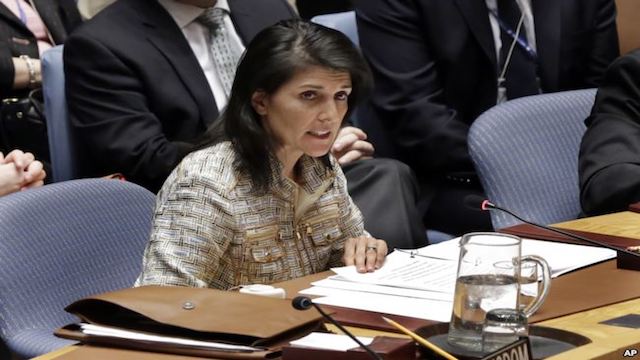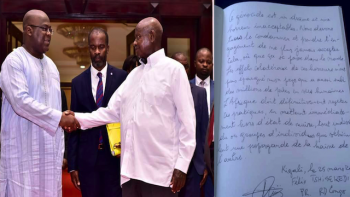The U.S. ambassador to the United Nations, Nikki Haley, said on Wednesday March 29, 2017, commenting as a proposal on MONUSCO's renewal was being debated, that the U.N. peacekeepers in the Democratic Republic of Congo (DRC), serving within MONUSCO, are aiding a DRC government that is "corrupt and preys on its citizens". The United States will be leading the UN Security Council in April 2017.
"The U.N. peacekeeping mission is mandated to partner with the government," Ambassador Nikki Haley continued, while addressing the Council on Foreign Relations in New York, "In other words, the U.N. is aiding a government that is inflicting predatory behavior against its own people. We should have the decency and common sense to end this." The mendate of the mission was eventually extended to March 31, 2018.
The unequivocal comments and strong position by the US Government against the corrupt regime led by Joseph Kabila, comes amid a deteriorating political and security situation in the DRC and a growing isolation of the government. Leaders around the World have been distancing themselves from DRC leaders in recent days, following the failure of the political dialogue brokered by the National Episcopal Conference of the Democratic Republic of Congo (DRC), known as CENCO between President Joseph Kabila's political alliance, the presidential majority (MP) and the Rassemblement, a broad coalition of opposition groups.
Pope Francis said on March 13, 2017 that he was cancelling a long planned trip to DRC. He was due to travel to DRC and its neighbour, the Republic of Congo, in July-August 2017.
The US Government's position also comes after the confirmation of the murder of two U.N. experts, Swedish national Zaida Catalan and American Michael Sharp, along with an interpreter and three drivers, who had gone missing in early March in the Kasai Province, while investigating widespread violence and alleged human rights violations carried out by the Congolese army and local militia groups. Most observers appear to point the finger to FARDC, as the potential suspects in the murders, referring to the order from DRC government to reinforce troops in Kasai to fight the insugency known as KAMUINA NSAPU in Kasaii (see Jan 2, 2017 Secret Telegram here).
Despite pressure, both internal and external, on DRC President Joseph Kabila to accept the peaceful transfer of power, with major concessions from the opposition to allow a smooth transition, Joseph Kabila has so far refused to approve the execution of the provisions of the accord brokered by CENCO. Since the beginning, there were signs that Joseph Kabila has long expected this outcome. He has already brought in Rwandan special forces to reinforce his Republican Guard, iafter the withdrawal of the Angolan troops and to repress potential uprising and insurgencies.
As Joseph Kabila hangs onto power, the country has been rocked by deadly clashes and massacres of young people and children, especially in the provinces of Kasai (see background here), Central DRC and in the capital city of Kinshasa.
The situation has deteriorated so much that some opposition figures contacted by AfroAmerica Network have rejected the deal itself, even if it were implemented. They pointed to the evident inability of the signatory parties to start the implementation of the agreement, months after its signature, and accused Joseph Kabila of intentionally blocking the accord so that he may rig elections. Some leaders, have asked their followers to observe the boycot of any commercial or government activities in the capital city of Kinsahasa and the major cities around the country, including Lubumbashi and Kisangani.

















